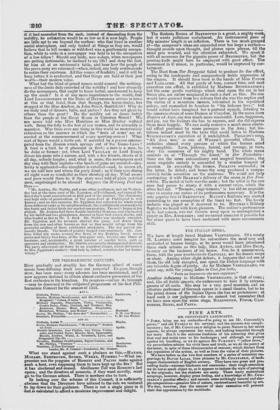THE PHILHARMONIC CONCERTS.
How gradually and steadily has the German school of vocal music been diffusing itself over our concerts! Its pace, though slow, has been sure: every advance has been maintained, and it now appears destined to obtain almost exclusive possession of the first orchestra in the kingdom. Its progress—rather its triumph —may be discerned in the subjoined programme of the first Phil- harmonic Concert for the season of 1831.
ACT I.
Sinfonia, Eroica. . Beethoven. Duetto, Madame Stockhausen- and Mr. Phillips (Der
Berggeist) "Calms, 0 belle".. ... Spohr. Military Septetto, Pianoforte, Violin, Violoncello, Contra Basso, Flute, Clarinet, and Trumpet, ills. Anderson, Messrs. Mori, Lindley, Dragonetti,
Nicholson, Willman, and Harper Plummet. Scents, Mr. Phillips, "Ali dove mai " (Ettryanthe).... 0.51. von Weber. Overture, Euryanthe .. C. 51. von Weber.
ACV II.
Sinfonia, Letter V. Haydn, Scene, Madame Stockhausen, " Mi sospinge " (2 emirs ed Azor) Spohr. Double Quartetto, four Violins, two Violas, Violon- cello, and Contra Basso, Messrs. Mori, Spagnoletti, Moralt, Lindley, Watts, A. Griesbach, Lyon, and Dragonetti (Op. 65) Spohr. Terzetto, Madame Stockhausen, Signor Curioni, and Mr. Phillips, "Tremate " Beethoven. Overture, Ii Don Giovanni . Mozart.
Leader, Mr. F. Cramer—Conductor, Mr. Cramer.
What can stand against such a phalanx as this,—HAynN, MOZART, BEETHOVEN, SPOHR, WEBER, HUMMEL ?—What im- pression can the popguns of ROSSINI and PACINI make against such a host, even supposing them to have kept up the fire ? But it has slackened and ceased. Guillaume Tell was Rossm's last opera; and the directors of concerts, if they want novelty, must go to the German school. There is nowhere else to turn.
In looking over the scheme of this Concert, it is. sufficiently .obvious that the Directors have adhered to the rule we ventured - to lay down for their guidance. There is not a single piece in it butis calculated to afford a musician improvement and delight.
The Sinfonia Eroica of BEETHOVEN is agreat, a mighty woik i ;
but it wants judicious curtailment. An instrumental piece of fifty minutes' length is an infliction. There is too much grasped
at—the composer's ideas are .expanded over too large a surface—. thought crowds upon thought, and phrase upon phrase, till the
mind gets wearied, and the attention exhausted. We speak it with all reverence for the gigantic power of BEETHOVEN, but the pruning-knife might here be employed with good effect. The movement fir C minor, in particular, would be improved by cur- tailment.
The Duet from Der Berggeist failed to produce its due effect, owing to the inadequate and comparatively feeble expression Of the singers. It should have been in the hands of Miss PATON and LABLACHE. All that purity of tone, correct time, and neat execution can effect, is exhibited by Madame STOCKHAUSEN ; but the same gentle warblings which steal upon the ear in her Swiss airs, are rather misplaced in such a duet; as this. No one would have guessed from her delivery that she was the captive and the victim of a mountain daemon, entombed in his sepulchral palace, and compelled to hearken to "his hideous love ;" but would rather have imagined her a pastoral nymph, listening to the amorous strain of some Damon or Corydon. In the scena from Zemira eel ilzor, she was much more successful. Love, happiness, and joy, are the feelings she has to express, and she did express them most happily. We can easily conceive a much more electri- cal effect produced by some passages in the Aria; but fas- tidious indeed must be the taste that could listen to Madame STOCKHAUSEN'S execution of it undelighted. PHILLIPS'S song, "Ah dove mai," is one of WEBER'S powerful efforts. It embodies almost every passion of' which the human mind is susceptible. Love, jealousy, hatred, and revenge, in turn, obey the summons of his mighty hand. The whole scena reminds us of "Through the forest," in Der Freischutz : there are the same extraordinary and magical transitions ; the same exquisite melody is succeeded by a similar tempest of passion. In executing the former, PHILLIPS succeeded ; in the latter, he failed ; and hence the song produced a compa- ratively feeble sensation on the audience. We could not help contrasting it with BRAHAM'S delivery of the scena in Der Frei- schiitz. The metal of both was the same ; but the artist in the one case had power to stamp it with a current value, which the other had not. " Tremate, empi tremate," is too old an acquaint- ance to render any notice of its performance necessary. It is the only popular trio of BEETHOVEN. HAYDN'S Sinfonia was started (according to our conception of the time) too fast. The lovely andante was played as it deserved to be. HUMMEL'S Military Septetto we heard with fresh pleasure. The author's performance of it, last season, was not thrown away upon so accomplished a player as Mrs. ANDERSON ; and we cannot conceive it possible for the other parts to have been sustained with more consummate skill.


























 Previous page
Previous page